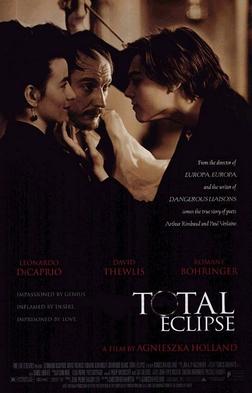Remove ads
Total Eclipse is a 1995 erotic historical drama film directed by Agnieszka Holland,[3] based on a 1967 play by Christopher Hampton, who also wrote the screenplay. Based on letters and poems, it presents a historically accurate account of the relationship between 19th-century French poets Arthur Rimbaud (Leonardo DiCaprio) and Paul Verlaine (David Thewlis).[4] Warner Bros. has included the film in the catalogue of Warner Archive Collection.[5]
| Total Eclipse | |
|---|---|
 Total Eclipse original theatrical poster | |
| Directed by | Agnieszka Holland |
| Written by | Christopher Hampton |
| Produced by | Jean-Pierre Ramsay-Levi Philip Hinchcliffe Victor Glynn Co-Prod |
| Starring | |
| Cinematography | Yorgos Arvanitis |
| Edited by | Isabelle Lorente |
| Music by | Jan A.P. Kaczmarek |
| Distributed by | Fine Line Features |
Release date |
|
Running time | 111 minutes |
| Countries | United Kingdom France Belgium Italy United States |
| Language | English |
| Budget | €6,780,000[1] |
| Box office | $340,139[2] |
The older Paul Verlaine meets Arthur Rimbaud's sister Isabelle in a café in Paris. Isabelle and her mother want Verlaine to hand over any copies he may still have of Rimbaud's poems so that they can burn them. Verlaine reflects on the relationship he formed with Rimbaud, beginning when the teenaged Rimbaud had sent his poetry to Verlaine from his home in the provinces in 1871. Verlaine impulsively invited him to his rich father-in-law's home in Paris, where he lives with his young, pregnant wife. Rimbaud displays no sense of manners or decency, scandalising Verlaine's pretentious, bourgeois in-laws.
The 27-year-old Verlaine is seduced by the 16-year-old Rimbaud's physical body as well as by the originality of his mind. The staid respectability of married life and easy, middle-class surroundings had been stifling Verlaine's admittedly sybaritic literary talent. Rimbaud acts as sadistically to Verlaine as does Verlaine to his young wife, whom he eventually deserts. A violent, itinerant relationship ensues between the two poets, the climax of which arrives in Brussels when a drunken and enraged Verlaine shoots Rimbaud and is sentenced a fine and two years in prison for sodomy and grievous bodily harm.
In prison, Verlaine converts to Christianity, to his former lover's disgust. Upon release he meets Rimbaud in Germany, vainly and mistakenly seeking to revive the relationship. The two men part, never to meet again. Bitterly renouncing literature in any form, Rimbaud travels the world alone, finally settling in Abyssinia (modern day Ethiopia) to run a "trading post". There he has a mistress. A tumour in his right knee forces him back to France where his leg is amputated. Nevertheless, the cancer spreads and he dies at the age of 37. When he dies, the image of one of his most famous poems, Le Dormeur du val, appears.
During her conversation with Verlaine, Isabelle Rimbaud asserts that her brother had accepted confession from a priest right before he died, showing Christian penitence, which is why only the censored versions of his poetry should survive. Verlaine pretends to agree but tears up her card after she leaves. Later, Verlaine, drinking absinthe (to which he has become addicted), sees a vision of the sixteen-year-old Rimbaud. The film ends with the young Rimbaud walking alone on a mountain range, Verlaine proclaiming that they were both happy together, and Rimbaud claiming to have finally found eternity.
Remove ads
- Leonardo DiCaprio as Arthur Rimbaud
- David Thewlis as Paul Verlaine
- Romane Bohringer as Mathilde Mauté
- Dominique Blanc as Isabelle Rimbaud
- Felicie Pasotti Cabarbaye as Isabelle, as a child
- Nita Klein as Rimbaud's Mother
- James Thiérrée as Frédéric
- Emmanuelle Oppo as Vitalie
- Denise Chalem as Mrs. Mauté de Fleurville
- Andrzej Seweryn as Mr. Mauté de Fleurville
- Christopher Thompson as Carjat
- Bruce Van Barthold as Aicard
- Christopher Chaplin as Charles Cros
- Christopher Hampton as The Judge
- Mathias Jung as André
- Aza Declercq as prostitute
Remove ads
In 1999, a DVD edition of the film was released. It features both a widescreen and fullscreen version of the film on the same disc as well as the film trailer.
Critical response
Total Eclipse has an approval rating of 22% on review aggregator website Rotten Tomatoes, based on 18 reviews, and an average rating of 4.5/10, against a 60% score with audiences.[6] Metacritic gives the film a weighted average score of 42 out of 100 based on 17 critics, indicating "mixed or average reviews".[7] A Variety review by Todd McCarthy describes Total Eclipse as a "poorly executed biographical film that fails to capture the artistic achievements of poets Arthur Rimbaud and Paul Verlaine, instead focusing excessively on their destructive personal relationship, which detracts from the film's intended exploration of their artistic contributions."[8]
Remove ads
Remove ads
Wikiwand in your browser!
Seamless Wikipedia browsing. On steroids.
Every time you click a link to Wikipedia, Wiktionary or Wikiquote in your browser's search results, it will show the modern Wikiwand interface.
Wikiwand extension is a five stars, simple, with minimum permission required to keep your browsing private, safe and transparent.
Remove ads